
How one Afghan family was reunited in the U.S. after two years apart
The Hussaini family are now rebuilding their lives in Salt Lake City, Utah.

The Hussaini family are now rebuilding their lives in Salt Lake City, Utah.
Amid the chaotic scenes at the Kabul airport in August 2021, Hazar and Sanowbar Hussaini were torn apart from their beloved daughters, which led to a heart-wrenching two year wait for their reunion. Here is their story.
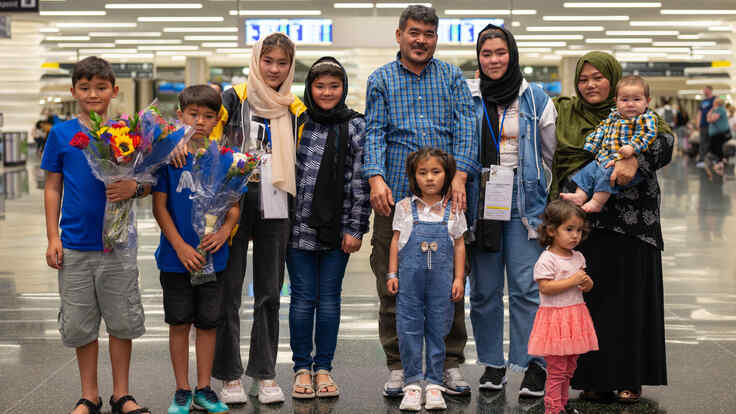
Life was tough in Afghanistan for Hazar Hussaini and his family. “They wouldn't let the girls go to school,” he recalls.
But it was when the Taliban took control that he knew he had to get his family—his wife, Sanowbar, and eight children—out. "The majority of my friends and my family were working or employed by the U.S. Army," he explains. "My brother-in-law was a member of the special forces. He sent us a letter that told us that we had to get out of the country because our lives were in danger.”
A few days later, the family found themselves at the Kabul airport, on their way to be evacuated to the United States as part of Operation Allies Welcome. In the rush of people, three of the children, daughters Sitara, Vaniya and Shahla got separated from the rest of the family and were forced to leave the area.
With no way of finding them, the girls were forced to remain with their grandmother, who lived thousands of miles from their treasured family.
“My other family members and friends, they all blamed me because they thought it was my choice to leave the daughters,” their father Hazar recalls sadly. “They were mad at me and made me feel like it had been on purpose.”
Hazar, Sanowbar and their remaining children received support from the IRC to help settle into their new life in Salt Lake City in the U.S., including supporting them with their rent payments for the first year. While this meant that they were safer than they would have been in Afghanistan, they desperately longed for Sitara, Vaniya and Shahla to be there with them. “Whenever I saw airplanes in the sky, I said I hope that one of the airplanes will be carrying my daughters to come here,” says Hazar.
He explains that they frequently visited the IRC office and received regular updates via email about his daughters.
Immigration and legal representative Pedro Moncada was supporting the Hussainis’ case from the IRC office in Utah. In March 2022 he submitted a petition to CARE, a U.S. government-run program for reunification. Determined to push the case forward, he’d tell himself: “I don't care what I have to do, but I'm going to help these girls be with their family.”
“Sometimes at 5:00 o'clock in the morning I would be emailing people back and forth for two hours until my kids woke up,” Pedro adds. “Then when my kids were awake, I'm not kidding, I’d be changing a diaper while trying to email someone at the State Department about this case.”
I don't care what I have to do, but I'm going to help these girls be with their family.
Finally, after a year and nine months, Pedro’s team received a call in May 2023 to inform them that Hazar and Sanowbar’s girls were on their way to the U.S. They would soon get to hold them in their arms again.
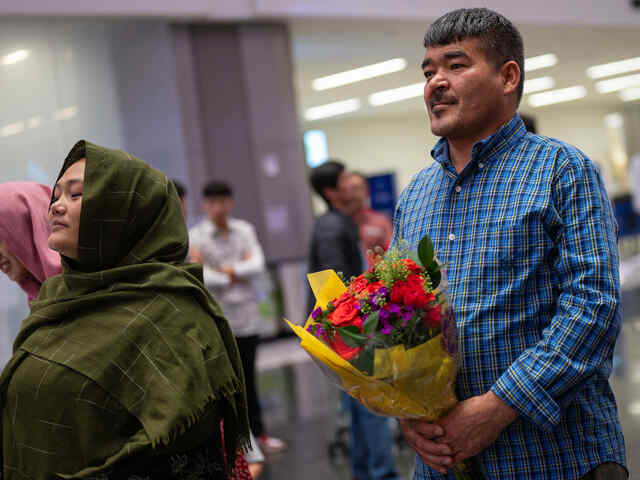
With a smile, Hazar recalls how he took a wrong turn and got lost while driving to the airport because he was so excited to meet his daughters.
“And I’d put some flowers in my younger daughter’s car seat for her to see when they got in the car for us to drive them back home,” he remembers. “But we were in such a rush that we forgot to bring the car seat and the flowers as well.”
With the IRC’s support, the Hussainis could reunite through the CARE program, which was specifically designed for Afghans separated at Kabul airport. However, options for separated families in different circumstances are extremely limited. This has resulted in thousands of Afghans enduring ongoing anguish and trauma as they wait to be reunited with loved ones.
“It's very important to be with family,” Sanowbar asserts. “When our daughters were apart from us we were counting the days, we couldn't be relaxed, we were always in this deep anxiety thinking ‘Where are they and what are they doing?’ And now they are here, we’ve just lost track of time and we are not anxious anymore.”
Watch the moment the Hussaini family was reunited.
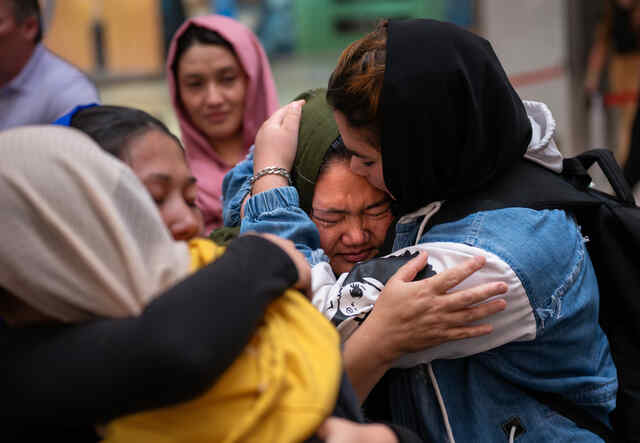
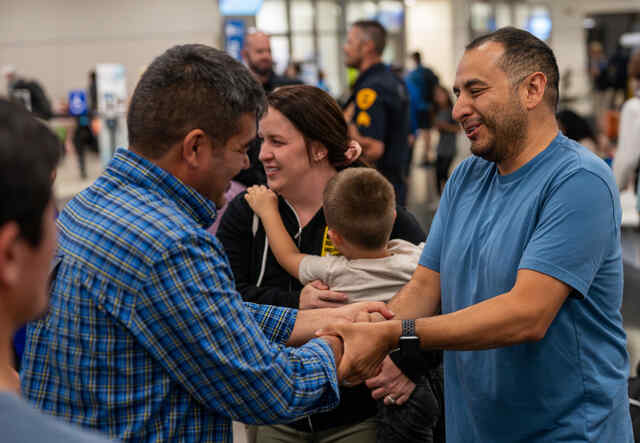
Looking ahead, Hazar and Sanowbar have a profound wish for their children’s future. They hope that all their kids will complete their education and have abundant opportunities in life. This desire is particularly strong for their daughters, who were previously unable to attend school. “They were away from school for two years,” says Hazar, “so seeing them enroll and go now makes me very, very happy.”
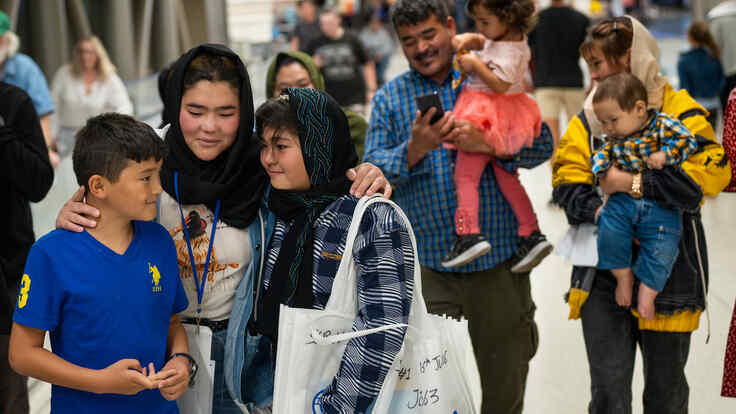
In the USA, the International Rescue Committee plays a vital role in providing resettlement and integration services for refugees, asylum-seekers, and humanitarian parolees, including those from Afghanistan. In 2021 alone, the IRC resettled more than 11,000 Afghan refugees in the U.S. through Operation Allies Welcome. This initiative not only offers immediate aid when Afghans arrive in U.S. communities but also extends long-term support for integration and employment.
We provide a wide range of resettlement and integration services tailored to meet the unique needs of refugees, asylum seekers and humanitarian parolees. These services encompass crucial aspects such as housing, facilitating school enrollment for children, providing English language and job training classes for adults and connecting them with essential medical services.
Sadly, despite these efforts many Afghan families in the U.S. face significant challenges when it comes to successful integration, due to the absence of a clear pathway to permanent residency or citizenship. This unfortunate reality hampers their ability to reunite with family members and exacerbates existing backlogs within the immigration system. Despite meeting the definition of a refugee, these Afghans find themselves under a cloud of legal uncertainty.
To address this pressing issue, the IRC is actively advocating for the passage of the Afghan Adjustment Act. This legislation aims to provide stability and support to more families by offering a sense of security and belonging, which can hopefully foster their successful integration into American society.
“Since the 2021 evacuation, Afghan humanitarian parolees have become a part of the rich cultural and economic fabric of America,” says Hans Van de Weerd, the IRC’s senior vice president for resettlement, asylum and integration. “However, their success and future remains in limbo as long as they do not have a clear pathway to permanent status. The Afghan Adjustment Act must be passed to ensure Afghan humanitarian parolees are able to continue rebuilding their lives and have the opportunity to reunite with their families.”